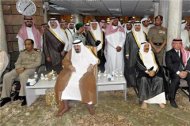Prince Nayef bin Abdulaziz Al Saud, the Saudi crown prince whose death was announced on Saturday, has been laid to rest in Mecca.
The 88-year-old King Abdullah travelled to Mecca on Sunday for the ceremony, as did other members of the royal family and international dignitaries. Seated next to Abdullah was Field Marshal Mohamed Hussein Tantawi, Egypt's military ruler. The emir of Kuwait was also among the heads of state who attended the funeral.
A group of Saudi princes received Nayef's body in Jeddah earlier in the day. The crown prince and longtime interior minister was to be buried in Al-Adl cemetery near the grand mosque in Mecca, where several other members of the royal family are buried.
Nayef, who was 79 years old, died of "cardiac problems" while at his brother's residence in Geneva, according to Saudi medical sources. He had sought medical treatment outside the kingdom several times in recent years.
He was among the most hidebound figures in a conservative Saudi hierarchy; he opposed granting women the right to drive, for example, as well as Abdullah's pledge to allow women to vote in municipal elections scheduled for 2015.
Nayef became interior minister in 1975, and held that post until his death. He controlled security services which employ some 130,000 people, and used them to stamp out perceived threats to the monarchy.
His efforts to combat al-Qaeda over the last decade made him a popular figure in the West. Nayef initially refused to believe that Saudi al-Qaeda members were behind the September 11 attacks - he described them as a Jewish plot - but changed his position on the group after it started attacking targets inside the kingdom.
But he also considered political opponent a threat, and jailed many of the leaders of a reform movement in 2003 and 2004. More recently, security services under Nayef's control arrested women who defied the country's ban on female drivers, and cracked down on Shia protests in easternSaudi Arabia.
Prince Ahmed, the deputy interior minister and Nayef's brother, is seen as a likely candidate for the top job at the ministry.
Succession questions
Abdullah has now outlived two of his appointed successors, the other being Prince Sultan, who died of an unspecified illness in October. Nayef's death will almost certainly raise fears about the order of succession within the ageing Saudi royal family.
His likeliest replacement is 76-year-old Prince Salman, the longtime governor of Riyadh who was appointed defence minister in October following Sultan's death. Salman's health is questionable; he has had at least one stroke in recent years.
But his death does open the possibility that a member of the younger generation will ascend to the role of heir apparent.
In 2006, Abdullah established the Allegiance Council, a group of senior princes empowered to determine the order of succession. The council is expected to convene later this week to choose a successor.
World leaders were quick to offer their condolences after Nayef's death.
US President Barack Obama said Nayef helped "develop a strong and effective partnership in the fight against terrorism".
French President Francois Hollande said his country had lost a "friend," while Switzerland, where Nayef died, offered "deepest condolences".
"Crown Prince Nayef devoted his life to promoting the security of Saudi Arabia," Ban Ki-moon, the UN secretary-general, said.




0 komentar:
Posting Komentar